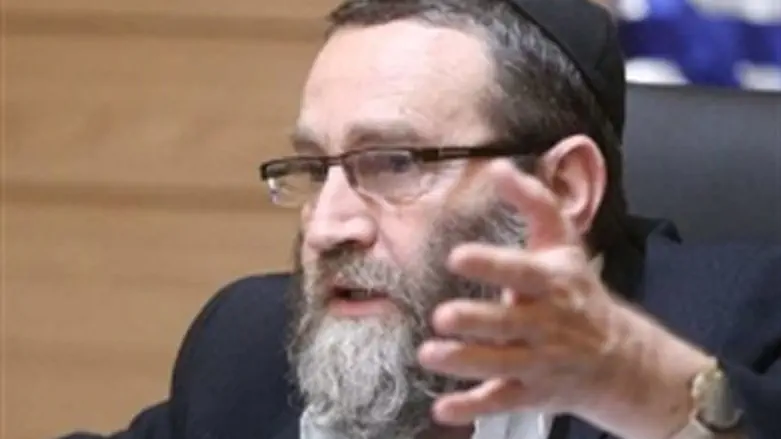
In what could be the first “crack” in the opposition of hareidi parties to the government's decision to draft hareidi yeshiva students, United Torah Judaism (UTJ) MK Moshe Gafni said that the only yeshiva students who should be exempt from IDF service are yeshiva students who learn full time.
“Nine out of ten IDF soldiers do not serve in combat units and yet they are still considered as 'defenders of the state.' In the same way, those who study Torah defend the state,” Gafni said. “As far as I am concerned, anyone who does not study Torah day and night should be drafted.”
Gafni was discussing the government's proposal to draft hareidi yeshiva students, which a special committee of MKs is in the process of hammering out. Gafni, along with other UTJ and Shas MKs on the committee, sharply condemned committee members, saying that hareidi leaders would fight the proposal on each and every point.
“We are not a rubber stamp for the government,” Gafni said. “The proposal that this committee is considering is just raw material for a final law. I am sure that the final law will look much different, because we cannot force the community to do things it is not capable of.”
Among the proposals approved by the government for the law is the drafting of all yeshiva students age 18 and older, except for 1,800 top scholars who would receive exemptions. In recent months, hareidi MKs have condemned the law as being designed to destroy their communities and force yeshiva students out of the house of study and into the army. Monday's comment by Gafni was the first time a hareidi MK indicated that the parties might be open to a compromise whereby hareidi youths who were not in yeshiva full time would be drafted.
Gafni's comments were echoed by MK Meir Porush, who said that the hareidi parties “never tried to defend those who sought a draft exemption but were not learning Torah. The problem is that even if we do draft all hareidi youths who are not studying Torah, we will still not reach the number of draftees the state is demanding from us.”
MK Ariel Attias (Shas) said that “there is a consensus among hareidi MKs not to defend those who are not studying. The average hareidi has a very positive attitude to the IDF. The problem starts when they try to force us to change our lifestyle. We have to tell the truth – a hareidi youth who joins the IDF before age 21 will have a hard time finding a bride,” as matchmakers will refuse to seek out brides for them.
As far as the IDF was concerned, said General Gadi Admon, who represented the army at the discussion, the problem was zeroing in on who was really learning, and who was just pretending. “There are thousands of registered students in yeshivas who are not learning, but we have no way of identifying them,” he said. I want to know how a yeshiva head, who is supposed to be a spiritual leader, can sign a document that falsely testifies that a student is learning, even if he is not doing so.”
Emergency service training
Gafni's comments came on the same day as Economics Minister and Bayit Yehudi (Jewish Home) head Naftali Bennett presented his plan for solving the hareidi draft issue. Bennett proposed that Hareidi recruits to the IDF should be trained to work as emergency rescue workers to deal with casualties of a mass attack on the homefront.
Bennett told the committee of MKs that the solution was an ideal one. “After we passed and approved the bill that will ensure equal service by all Israelis, we have devices a plan that will ensure that all can serve,” Bennett said. “Working in emergency services will be one way for hareidi Israelis to serve the country.”
The training will be provided as a part of the civil draft that Israelis can enroll in to fulfill their military obligations, and which many hareidi youths are expected to prefer. Enrollees in this program will be expected to serve at least 36 hours per week, and will receive 75% of the salary that IDF support personnel receive. Bennett asked Sar Shalom Jerbi, director of the Civil Service program, to begin the training program for hareidim in the rescue services as soon as this November.
Those who undergo the training will also be eligible for IDF reserve duty, Bennett added.
“The IDF will be able to use tens of thousands of hareidi recruits in a most effective manner to deal with emergencies,” he said.